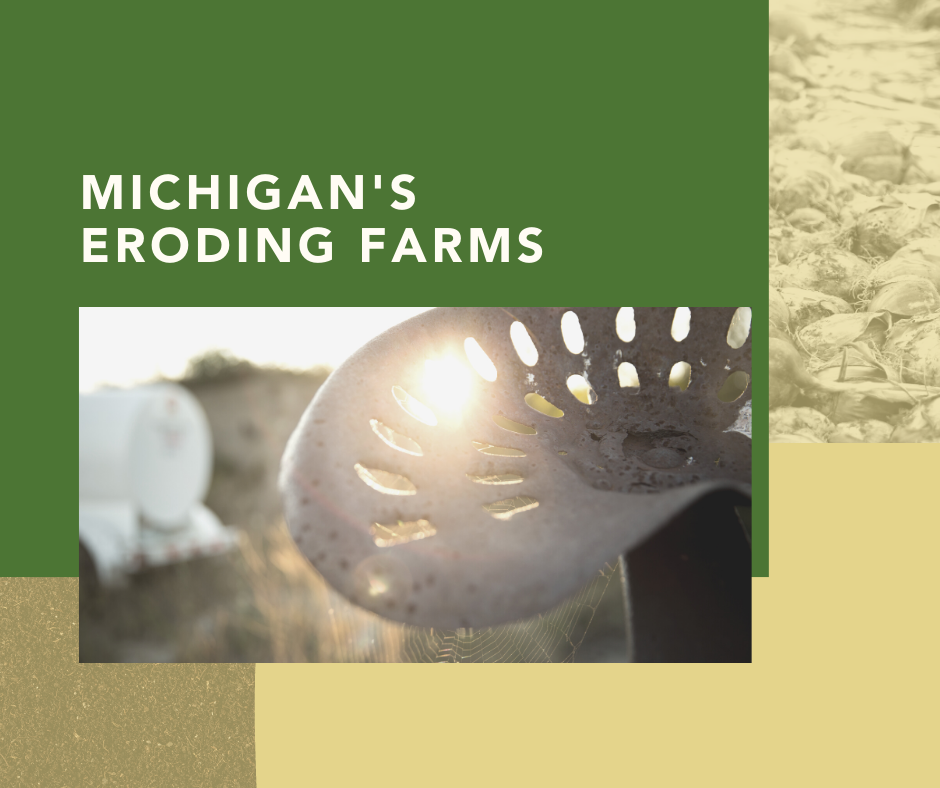Farmland Preservation
Increasingly, Michigan’s agricultural land, agricultural products, and innovative industry potential are becoming an invaluable focus on which to base Michigan’s future. Annually, the agri-food business contributes $73 billion to the state’s economy and employs over 1 million residents (25% of the people working in Michigan). Michigan’s agricultural economy expanded at a rate of 5.9%, a full percentage point above the state’s general economy, between 2004 and 2006 and continues to expand. Producing over 120 commodities on 10 million acres of farmland, Michigan prides itself as the second-most agriculturally diverse state in the nation, leading United States production of 19 commodities. From fresh, local fruits and vegetables available around the state to the commodities we export, Michigan can’t afford not to invest in agricultural land protection.
PROTECTING MICHIGAN'S AGRICULTURAL FUTURE
Heart of the Lakes’ Protecting Michigan’s Agricultural Future report, makes the case for farmland preservation, assess needs, synthesizes documentation and case studies, and recommends action through advancing public policy and strengthening existing preservation programs. Download Full Report (PDF 1.2 MB)
PROTECTING MICHIGAN'S AGRICULTURAL FUTURE
Heart of the Lakes’ Protecting Michigan’s Agricultural Future report, makes the case for farmland preservation, assess needs, synthesizes documentation and case studies, and recommends action through advancing public policy and strengthening existing preservation programs. Download Full Report (PDF 1.2 MB)
FARMLAND RISK ASSESSMENT MAPS
Region 1 | Region 2 | Region 3 | Region 4 | Region 5 | Region 6 | Region 7 | Region 8 | Region 9 & 10
Michigan Fruit Belt Map
Michigan Fruit Belt Map Counties
Other Farmland Resources
Michigan Department of Agriculture
The Farmland and Open Space Preservation Act enables farm owners to enter into a development rights Agreement with the State that ensures that farmland is used for agriculture for a minimum of 10 years and ensures that the land is not developed in non-agricultural use.
Farmland Preservation Program (formerly P.A. 116)
The Farmland Preservation Program fosters preservation of farmland and open space through agreements between the Sate and a landowner. These agreements are entered into voluntarily by a landowner and place temporary restrictions on the land while preserving it for agriculture. This agreement is made in exchange for tax benefits and exemptions for various special assessments.
Agriculture Preservation Fund
The Agricultural Preservation Fund is a fund established to provide grants to eligible local units of government to help implement Purchase of Development Rights programs. These programs help support local efforts to preserve farmland.
Conservation Easement
The State of Michigan utilizes conservation easements, in order to restrict development on privately owned imperative land across Michigan. These easements are voluntary and legally recorded agreements between the landowner and the State (or land conservancy) that place restrictions on the development of the land which are held into perpetuity.
Conservation Reserve Enhancement Program (CREP)
In effort to supplement conservation practices regarding soil erosion, water quality, and wildlife habitat, critical to Michigan and the nation alike, Michigan is partnering with the Federal government to incentivize participation. Farmers and landowners who participate in this program will receive reimbursement for establishing practices, incentive payments for sign up, and rental payments for the length of the contract.
Michigan Department of Agriculture
The Farmland and Open Space Preservation Act enables farm owners to enter into a development rights Agreement with the State that ensures that farmland is used for agriculture for a minimum of 10 years and ensures that the land is not developed in non-agricultural use.
Farmland Preservation Program (formerly P.A. 116)
The Farmland Preservation Program fosters preservation of farmland and open space through agreements between the Sate and a landowner. These agreements are entered into voluntarily by a landowner and place temporary restrictions on the land while preserving it for agriculture. This agreement is made in exchange for tax benefits and exemptions for various special assessments.
Agriculture Preservation Fund
The Agricultural Preservation Fund is a fund established to provide grants to eligible local units of government to help implement Purchase of Development Rights programs. These programs help support local efforts to preserve farmland.
Conservation Easement
The State of Michigan utilizes conservation easements, in order to restrict development on privately owned imperative land across Michigan. These easements are voluntary and legally recorded agreements between the landowner and the State (or land conservancy) that place restrictions on the development of the land which are held into perpetuity.
Conservation Reserve Enhancement Program (CREP)
In effort to supplement conservation practices regarding soil erosion, water quality, and wildlife habitat, critical to Michigan and the nation alike, Michigan is partnering with the Federal government to incentivize participation. Farmers and landowners who participate in this program will receive reimbursement for establishing practices, incentive payments for sign up, and rental payments for the length of the contract.
